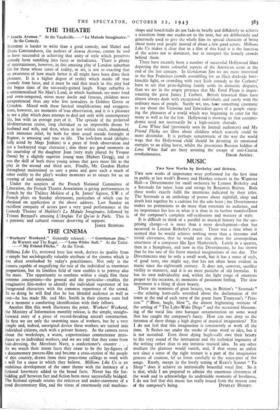Two New Works by Berkeley and Britten.
MUSIC
Two new works of importance were performed for the first time in public at last week's Boosey and Hawkes concert in the Wigmore Hall—a Divertimento for small orchestra by Lennox Berkeley and a Serenade for tenor, horn and strings by Benjamin Britten. Both these works exactly fulfil the intentions indicated by their titles. The Serenade is an anthology of poems about nightfall, sleep and death knit together by a cadenza for the solo horn ; the Divertimento makes no pretensions to do more than entertain its audience, and its importance lies less in what it is than in its further manifestation of the composer's complete self-realisation and mastery of style.
It is difficult to think of a parallel in musical history for the sur- prising change—it is more than a mere development—that has occurred in Lennox Berkeley's music. There was a time when it seemed that he would achieve nothing more than a tiresome and trivial cleverness, that he would not rise above the cosmopolitan smartness of a composer like Igor Markevitch. Lately in a quartet, then in a Symphony, and now in this Divertimento, he has shown that he has one of the finest musical imaginations of our day. The Divertimento may be only a small work, but it has a sense of style, of good taste, one might say, that has not often been evident in music since the eighteenth century. It does not, nowever, sacrifice virility to manners, and it is no mere pastiche of old formulas. It has its own individuality and, within the light range of emotions proper to the occasion, its moments of passionate feeling. The slow movement is a thing of sheer beauty.
There are moments of great beauty, too, in Britten's " Serenade " —the echoing horn-calls wreathed about the declamation of the tenor at the end of each verse of the poem from Tennyson's " Prin- cess " (" Blow, bugle, blow "), the almost frightening ostinato of the setting of "The Lyke-Wake Dirge" and the occasional blossom- ing of the vocal line into baroque ornamentation on some word that has caught the composer's fancy. How can one deny to the inventor of these things a high degree of musical imagination? Yet I do not feel that this imagination is consistently at work all the tithe. It flashes out under the stroke of some word or idea, but it is not sustained. Even those dying bugle-calls owe their beauty to the very sound of the instrument and the technical ingenuity of the writing rather than to any intrinsic musical idea. In any other medium the glamour would vanish, and, if that seems an unfair test since a sense of the right texture is a part of the imaginative process of creation, lef us listen carefully to the voice-part of the longs. Rarely, except in the lovely setting of Keats's Sonnet " To Sleep does it achieve an intrinsically beautiful vocal line. So it is that, while I am prepared to admire the enormous cleverness of the work and to acknowledge its undeniable moments of loveliness, I do not feel that this music has really issued from the inmost core


























 Previous page
Previous page